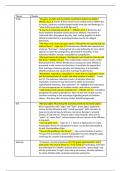Theme Quotes
Pride - “My parts, my title and my perfect soul/Shall manifest me rightly.”
Othello, Act 1.2. Power of three shows never-ending service Othello did
to Venice, contrasts racially-charged insults from Iago and Roderigo (i.e.
“what full fortune does the thick lips owe”)
- “A man he is of honesty and trust.” – Othello, Act 1.3. Reiterates the
heavy emphasis Venetian society placed on adultery. This theme is
reiterated often throughout the play, later coming together to show
Othello’s belief that he is punishing Desdemona for her alleged
dishonesty
- “The Moor is of a free and open nature/ That thinks men honest that but
seem to be so.” – Iago, Act 1.3. Dehumanises Othello with repeated use
of phrase “the Moor”, showing that he is only defined by his race, which
appears to cause the protagonist a great deal of insecurity. It also
reiterates Othello’s naivety, susceptible to manipulation.
- “She loved me for the dangers I had passed, and I loved her that she did
pity them.” Othello, Act 1.3. Their relationship is based on pity, rather
than genuine love. Where Desdemona is young and naïve, Othello is
presented as old, serious and lascivious. It could also be argued that
their marriage is based on genuine and lasting love. It is inevitably
Othello’s jealousy that causes their marriage to deteriorate.
- “Reputation, reputation, reputation! O, I have lost my reputation! I have
lost the immortal part of myself, and what remains is bestial.” – Cassio,
Act 2.3. The epizeuxis reiterates Cassio’s frustration about his
reputation, it seems he may have lost the ability to formulate
sophisticated sentences. The ecphonesis “O!” highlights the importance
of class and appearance in Venetian society, also mirrors a lament.
- “I will chop her into messes! Cuckold me!” – Othello, Act 4.1. Completely
juxtaposes his earlier pragmaticism. Here, he has lost control over his
emotions reverting to the stereotype regarding people of Southern
climes – that they often fall prey to their bestial backgrounds.
Evil - “Hell and night/ Must bring this monstrous birth to the world’s light.”
Binary opposition with “night” and “light”; shows Iago’s duplicitous
nature. Similar dichotomy with “monstrous birth”; birth connotes to
hope and maternal beauty whereas monstrous belongs to a lexical
domain of hell and evil. Tenuous link to Lady Macbeth, who calls on
“spirits” to “unsex (her)”. Internal rhyme mirrors rhetoric of the Witches
in Macbeth
- “I am not what I am.” – Iago, Act 1.1. Theme of appearance vs reality.
Anastrophe: shows his manipulative nature, can easily bend people at
his will. Machiavellian villain
- “I’ll pour this pestilence into his ear.” – Iago. Lexical domain of poison.
Tenuous link to Genesis: serpent manipulates Eve into eating the apple,
could Iago be a human representation of this evil?
Jealousy - “O, beware, my lord of jealousy! It is the green-eyed monster, which
doth mock/ The meat it feeds on.” Act 3, Scene 3. Foreboding, reiterates
that ultimately it is Othello’s jealousy that ruins him. “green-eyed” may
also be a reference to Iago’s own role as an envious, parasitic influence –
he mocks Othello while contemporaneously ruining him.




